Tamar Hermes wants you to get rich in real estate.
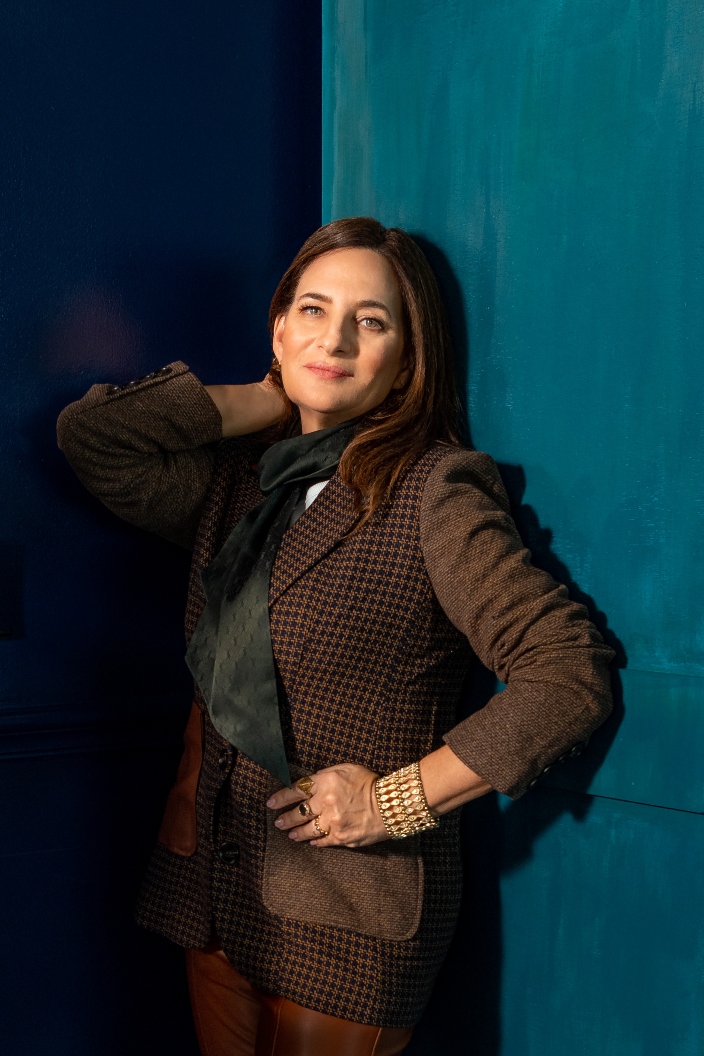
By Jenny Hoff, Photos by Joi Conti; Styled by Asma Parvez with inspiration from Nordstrom and Target;
Hair by James Freeman, Makeup by Melissa Michelle; Shot on location at Colton House Hotel, Special thanks to Kayla Lavender
Padding barefoot along the wooden floors in her expansive Westlake home—which is filled with beautiful art, fine furnishings and nestled in a grove of cedar and oak trees—Tamar Hermes is proud of the life she has created. A beautiful house, a close-knit family, a loving marriage and a self-taught financial prowess that allows her to depend on only herself for her millionairess lifestyle.
Hermes has become rich through real estate investing, and she wants you to do the same.
“I became it by doing it,” she says, sitting in her light-filled kitchen, overlooking a resort-style swimming pool that sits next to a basketball court in her backyard. “Anyone is capable of that. The world could be so miraculous if everyone could see their gifts.”
Originally from California, with a background in the entertainment industry and a film director husband, at first glance, it’s easy to assume Hermes had a leg up in her journey to wealth. But her origin story is worlds away from the world she lives in now.
Hermes grew up lower-middle class in Los Angeles, with immigrant parents who had so much of their own trauma to work through, they had little energy to offer any kind of emotional support and encouragement to Hermes and her sister.
Hermes’ father was from Transylvania, Romania, and had been sent to a work camp during World War II when he was just a child, experiencing violence and deprivation as a Jewish boy during the Holocaust. He was one of the few people in his family to survive the concentration camps. Her mother grew up on a kibbutz in Israel, when it was still fighting for statehood. Living along the Sea of Galilee, her childhood was marked with Syrian bombs and constant conflict. At 18 years old, she served in the Israeli army.
“To me, the most important thing is we took those experiences, and we didn’t reject them; we built upon them and made something valuable and important in our lives,” says Hermes’ sister, Rabbi Roz Mandelberg, who lives in Norfolk, Virginia. “We took what we could and turned it into something that could make an impact on others. Both in our own ways.”
For their parents, success meant surviving another day—there were no dreams and goals to work toward. They had a dramatically different culture and upbringing than their children and no real practice in communication. Hermes grew up feeling estranged and alone.
“They say trauma can live for generations in your body,” she says. “It can keep us from living a full life ourselves. I really didn’t feel loved growing up. When a kid feels that way, they’re not confident, and they’re scared.”
From Surviving to Thriving
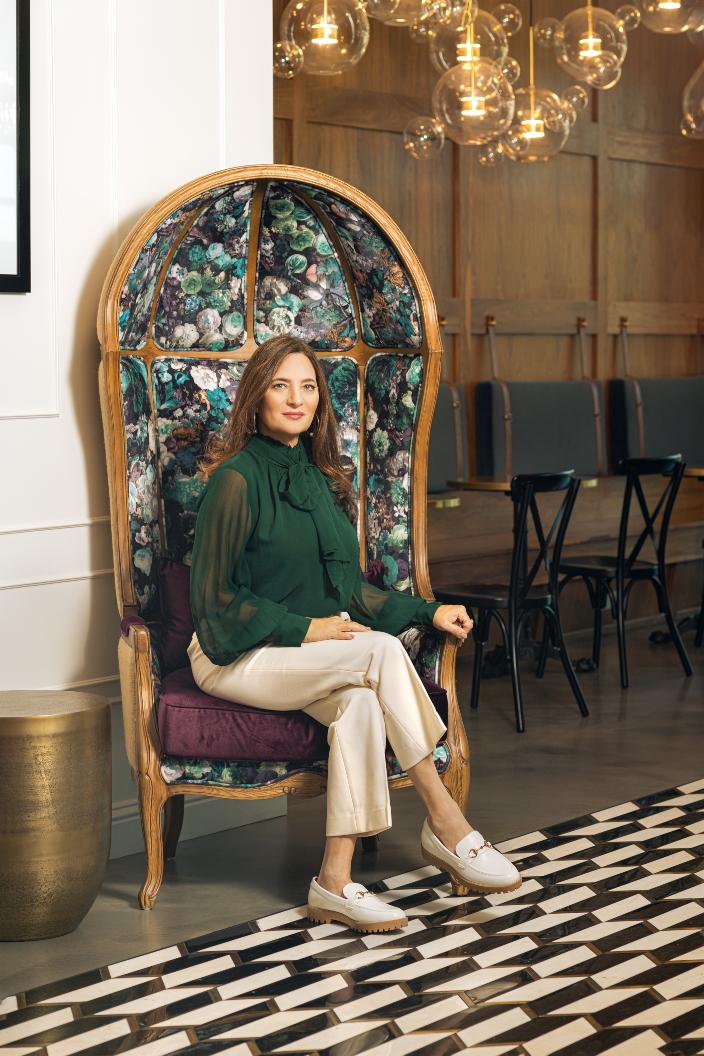
Hermes’ parents divorced when she was a child, and she and Mandelberg lived with their mom in their grandma’s house, sharing a sofa bed during their preteen and teenage years. Her family’s financial plan was living paycheck to paycheck.
In this environment, Hermes never learned about money, except that it was a source of stress and there was never enough of it. She was savvy enough to talk her way into a job at 14 years old and save up $5,000 over two years to buy herself a car at 16, but she wouldn’t learn what it really meant to have money until many years later. Wealth is much more than being able to afford a fancy house and car; it’s the power to not have to work for anyone else because your money, invested wisely, is working for you. It’s not about going into debt for consumption, but rather taking on debt as a tool to leverage the money you have and make it multiply.
It’s a lesson Hermes started to learn in her mid-twenties when she was working as a writer, producer and editor for on-air promotions, making enough to have a nice lifestyle and save a bit, but knowing deep down there was money she was leaving on the table for the men who had been taught how to get rich. “I had no financial background, and no one in my family had any real knowledge about money,” she says. “But I was street smart. Every month I was writing my landlord a check for rent, watching my friends and neighbors do the same. One day I asked myself, ‘How do I get on the other end of this transaction?’ That’s when I used my savings to buy my first duplex.”
Almost on cue, Hermes’ phone dings with an incoming message. It’s her bank sending an automated text that a new deposit has been made of around $3,000. She laughs and holds up the phone. “You know what this deposit is for? It’s the first of the month; rent checks are coming in.”
Hermes will be the first to tell you, real estate investing is not “fast money” unless you get lucky to buy at the right time in a booming market and have the capacity to flip and sell. But, she argues, it’s far more stable than the stock market and will almost always end up being a profitable investment. It also doesn’t take a fancy degree or years of training to learn how to do it.
“No one can convince me that real estate is not the best investment for women,” she says. “You can understand it, control it and make a lot more than in the stock market.”
Succeeding as a Mastermind
In her book The Millionairess Mentality, Hermes lays out all the knowledge she’s learned in her almost three decades of investing in real estate, as well as from the mastermind groups she’s been a part of with some of the most influential and successful investors in the country. There are no fancy charts or complicated diagrams to try to understand, only the basics of how to invest in real estate depending on your net worth, your time commitment and your goals.
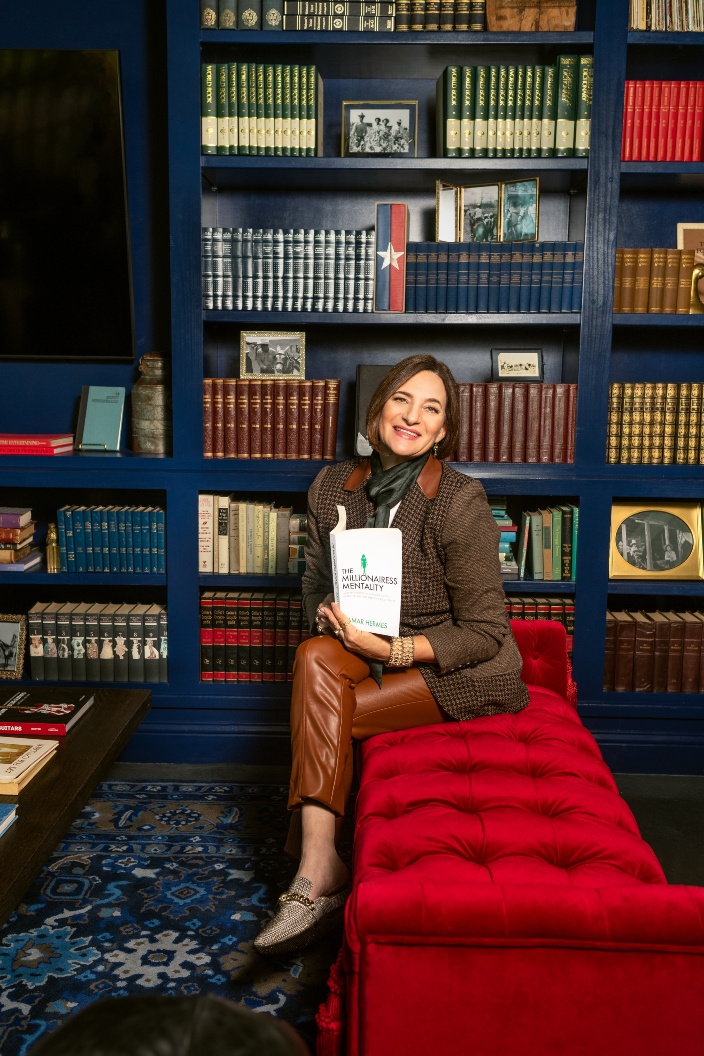
After years of investing, Hermes says she’s found her passion: educating women and empowering them to control their own financial destinies by getting into real estate, an industry still dominated by men. She now leads her own mastermind group, composed of entrepreneurial women across the country who make at least $1 million annually in revenue. Hermes brings in experts on different subjects and creates a space where the women can share their worries or struggles and help each other solve them.
“She really listens, and that’s important,” says one of Hermes’ clients Laura Spaulding. As the founder and franchisor of Spaulding Decon, she started the crime scene cleanup company after working as a police officer making little money, working long hours and hitting too many glass ceilings. “If you come to [Hermes] and you say, ‘I have a dilemma,’ she’ll be honest, and if she doesn’t have experience with that, she’ll find someone who can help. That’s priceless because entrepreneurship can be a lonely journey.”
Spaulding’s company has 46 franchise locations, and her YouTube channel has more than four million followers (it turns out lots of people like watching crime scene cleanups), but she says going from being a cop with no money to a business owner with millions in revenue, she needs more than ever a mastermind group to connect with other successful women entrepreneurs who are facing the same struggles and who can bring in different perspectives.
“Running my company, I’ve had some pretty obvious experiences with discrimination in getting funding,” she says. “Only 2% of venture capital goes to women. A mastermind group is imperative in meeting the right people who want to invest in you, and Tamar knows everyone.”
As for real estate, Spaulding says she’s been investing for years. “Often, I’ll buy the house from a client who doesn’t want to deal with a property where a crime took place. I’ll clean it and rent it out.”
As Spaulding exemplifies, and as Hermes explains in her book and her lectures, there is no cookie-cutter route to real estate investing. There’s an option for virtually anyone. If you’ve got a full-time job and a house full of kids, there are plenty of passive options where you can invest with a group on a piece of real estate and make around 15% return per year until the property is sold or refinanced and you get your investment back. For those with less cash who are willing to put in more time, there are opportunities to offer sweat equity to get in on a deal and help source the lot, assist with repairs and find renters. Or, in Spaulding’s case, if you’re comfortable cleaning up crime scenes, then you have an edge in a market where most people would be squeamish to deal with that kind of property.
“One complaint people have is that real estate is so illiquid,” says Hermes. “But the biggest problem with the stock market is it’s too liquid. People don’t make money because it’s too easy to take it out. We’re not buying the properties to sell them. We’re buying them to sit on them in perpetuity.”
Buoying other women to achieve financial success is Hermes’ best deal yet. While getting rich is fun, it turns out helping others to do the same and changing the trajectory of their lives is even more rewarding.
“I’ve never seen her so full of happiness,” says Mandelberg. “I think that filling comes from giving and empowering other women.”
Changing Your Money Mindset
One of the most limiting beliefs Hermes had to change in herself, and one she’s trying to change in other women, is that seeking wealth is somehow immoral, an ignoble pursuit. In fact, she learned, it’s the opposite. Money allows you to take care of your loved ones, to give back to the community, help others climb the ladder, influence society and to get a seat at the decision-making table.
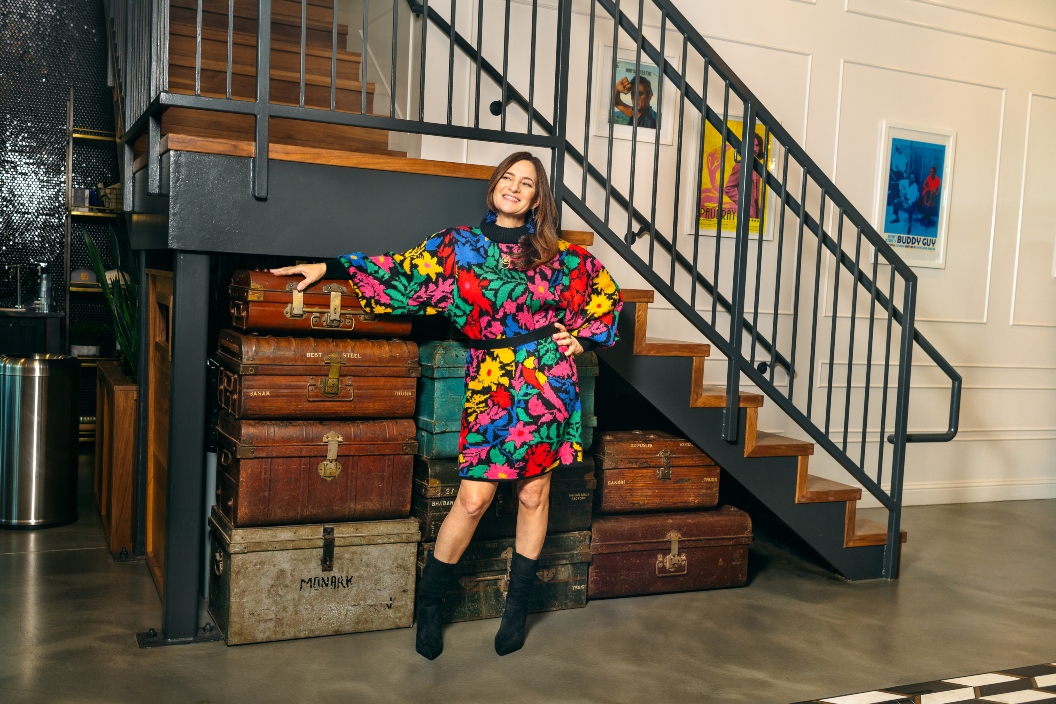
“One thing I had to break through that a lot of women have is disconnecting from a story that they’re born into and creating their own story,” Hermes says.
She is also determined that her children have their own story, one filled with financial knowledge—the kind she wishes she would have learned earlier in life.
“Both of us grew up poor; it’s important to know the value of things and not take them for granted,” says her husband, Matt Earl Beesley, a film and television director and Dallas native who has directed such movies a Point Blank and Braveheart (where he served as the second unit director), and TV shows like CSI and Chicago Fire. “We both have a very strong work ethic. My parents said, ‘Find something you are passionate about and then don’t be outworked.’ So, I did. She has that same ethic.”
It’s an ethic they’re trying to pass on to their children, who are growing up in very different circumstances than their parents experienced. “She teaches our kids about finance and encourages them to take accounting classes,” he says. “She teaches them how to ask the right questions. I got lucky to marry the smartest person I know.”
Hermes says their daughter, who is in college, has two part-time jobs. When she recently charged a bevy of DoorDash purchases to her parents’ credit card by mistake, she immediately refunded the money—because she earns her own. Hermes’ son goes to Westlake High School and recently bought a used car, after she worked with him on the numbers and helped him seek out a good deal. Hermes wants her children to build confidence at an early age that they can control their own financial destinies.
“My biggest regrets and mistakes were not loving myself more and believing in myself more early on,” says Hermes, “not realizing what I was capable of and letting the world dictate how my life would go.”
Part of loving herself now is making her health, both physical and mental, a priority. With the freedom to dictate her own schedule (because she has her investments burning the midnight oil instead of having to do it herself), Hermes only schedules meetings in the afternoon. She has the morning to meditate, exercise, jump in her cold-plunge pool, write and plan
“That’s the beauty of investing and making money beyond a paycheck,” she says, as she picks at the charcuterie board she’s prepared for the afternoon. “If I want to do something, I can. If we said, ‘Let’s have this meeting in Paris,’ we could buy two first-class tickets to Paris and chat over croissants. That’s what money can do.”
Hermes shares these examples, not to show off her wealth, but to encourage women that what seems impossible, a reality only for “other people” is within reach to everyone willing to roll up their sleeves, spend less on consumption, more on investments and develop the courage to try.
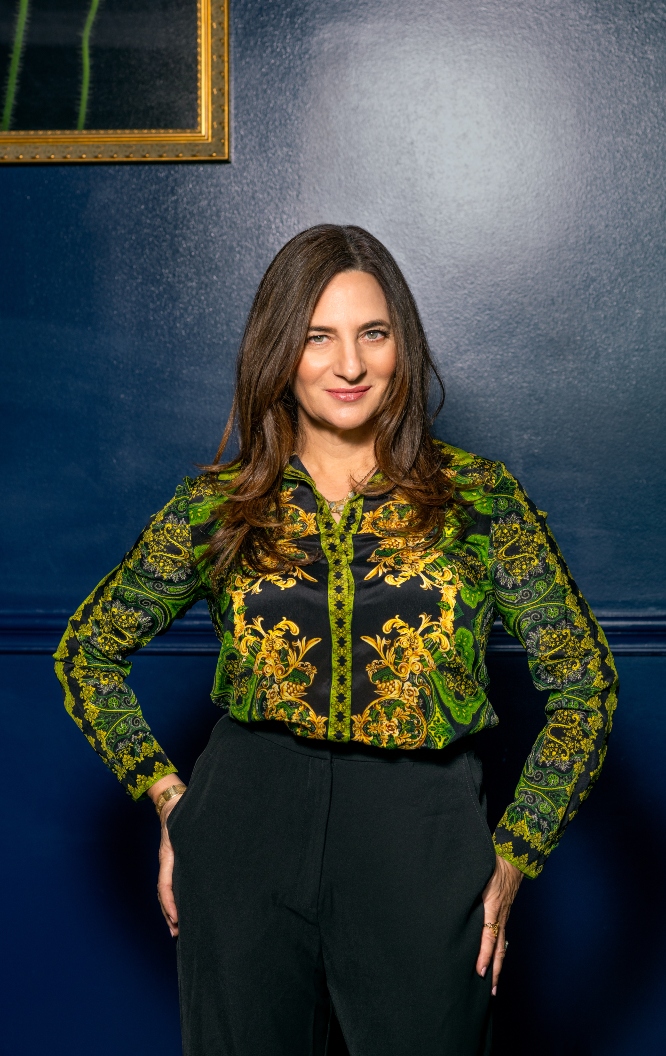
“It’s not ‘fake it till you make it,’” she says. “It’s ‘fake it till you do it.’ You must take the steps to do it. Be willing to hire mentors or take a chance on a property and get ready to start letting your money work for you a little bit. You can’t stay thinking small.”


